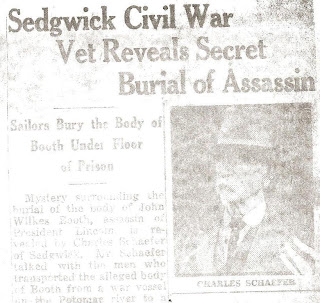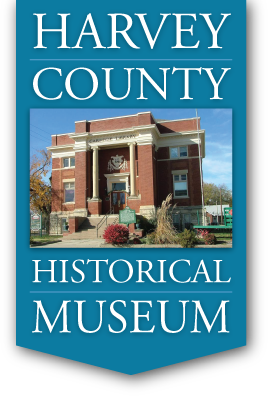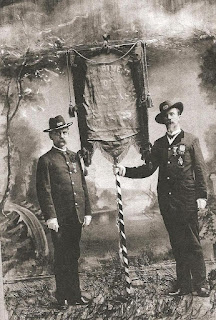by Kristine Schmucker, HCHM Curator
The death of Charles Schaefer on January 8, 1934 marked the end of an era in Harvey County, Kansas. Schaefer was the last of the early traders, soldiers and scouts that first saw the potential of Kansas. In his youth, he traveled the unbroken prairie as a scout and soldier. He fought in the Civil War and the Indian Wars, and could recall a time when the prairie was home to vast buffalo herds. In the late 1860s, he was among the first men, along with Wichita founders James R. Mead, William Greifenstein, and William Mathewson, to settle around the Arkansas River in the area that would become Sedgwick and Harvey counties.
A Man of Force and Leadership
His obituary describes Schaefer as “self-educated and self-made, attaining more than ordinary success and prominence, a man of force and leadership.”
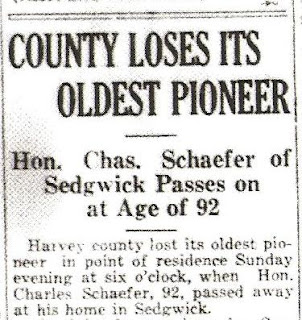 |
Evening Kansan Republican, Jan. 8, 1934
Front page |
Charles Schaefer was a man that seemed to have been involved in a little of everything. He spent his youth “as a successful plainsman and scout,” followed by a career in the Army during the Civil War. After the close of the war, he settled in Sedgwick to raise a family and was a successful businessman and townbuilder. Some of his remembrances were preserved in a file at the Sedgwick Historical Museum, Sedgwick, Ks. I am grateful to the Board of the Sedgwick Historical Museum and especially to Marcia Nordstrom, board president, for allowing me access to the files on the Schaefer family.
 |
| Charles Schaefer |
Unintentional Passenger
On the crowded St. Louis platform in 1852, few took notice of the young boy as they boarded the steamboat. None wondered why the boy was not in school or with his parents For ten year old Charles Schaefer, sneaking away from class and boarding a steamboat that day was the beginning of a grand adventure that would include the president of the United States, famous generals, rough soldiers and scouts fighting the Indian wars on the frontier.
The oldest of three boys, Schaefer was born in Hamm, Province of Westphalia, Prussia in December 1842 to Richard and Gertrude Eiseleben Schaefer. His father, Richard, was a soldier and reportedly had suffered some injury at Waterloo. By the late 1840s, the elder Schaefer had fled “his native country on account of the part he took in politics,” for the United States leaving his wife and sons behind.
In 1848, Gertrude made the voyage to the United States with her sons to join her husband. She died upon their arrival in New York. Richard, perhaps feeling ill equipped to handle all three of the boys, sent 10 year old Charles to relatives in St. Louis, MO. Young Charles already had a taste for adventure and was not content to sit quietly in school reading about great battles. He was ready to go explore! So, that day in St. Louis, he left school, and boarded a steamboat bound for Fort Leavenworth, KS.
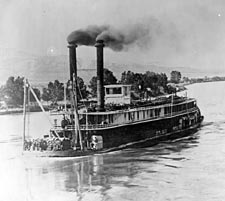 |
| Steamboat on the Missouri River |
Later in life Schaefer recalled his experience.
“While playing on board a steamboat that plied between St. Louis and Leavenworth he found himself unintentionally a passenger as the boat had embarked without his knowledge. Seeking to amuse himself . . . his eye was caught by a flag fluttering high on a hill. He followed it to find it led to the drill grounds of the soldiers at the fort. He became so absorbed watching them that he failed to take the boat when it returned. As night came on, the little boy of 10 years began to feel lonely and afraid. Colonel Fauntleroy who was at the fort in charge of an overland train to the U.S. troops in New Mexico noticed the lad and took him home with him.” (Charles Schaefer Autobiography #1 Schaefer Scrapbook)
Fort Leavenworth, KS
Fort Leavenworth, established in 1827, was the first permanent U. S. Army fort established in Kansas. By 1852, the fort served as a headquarters for commanders and the chief unit in the army’s frontier defense system. Schaefer described Fort Leavenworth as he remembered it in 1852.
“[It] never was really a fort. . . with two Block Houses one on corner of the Parade Ground the other diagonally across. There were squares with holes for cannons in the tower and loopholes for the musket men. There were 10 or 12 Calvary stables. Each would hold a troop of Calvary. The officers quarters were across the parade grounds, the barracks on one side and other buildings on the opposite side.” (Charles Schaefer Fort Leavenworth, Schaefer Scrapbook.)
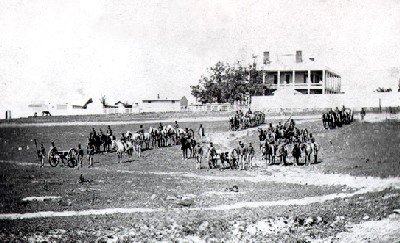 |
| Fort Leavenworth, Courtesy Wichita State University |
“Sober at the Time of Enlisting”
Col. Thomas T. Fauntleroy, who took the young boy in, was a commander of the First Regiment of Dragoons during the 1850s and led several campaigns throughout the region.
The Dragoon Regiment was authorized by Congress in March 1833 and was composed of soldiers who could ride to battle and fight either on horse or foot. Recruits were to be native born, 20 to 35 years old, and over five five five inches tall and “sober at the time of enlisting.” Over time, the Army had to reduce the restrictions to fill recruitment quotas. By the 1850s, recruits were not questioned too closely about their age or citizenship status, allowing young men like Schaefer to join.
Life in the fort was not easy. Disease was a constant threat to soldiers on the frontier. Cholera and malaria were more of a threat to the men than the Indians. Far more soldiers died of disease than from hostile action.
Outbreaks of malaria were annual occurrences at Fort Leavenworth. In 1843 and 1844, the Missouri River flooded due to heavy rains and the standing water became an ideal breeding ground for disease that the troops took with them to the field. In 1850, cholera broke out on boats bound for Fort Leavenworth, but the doctors on board did not know what was causing it or how to treat it. Once they arrived at the Fort, the entire fort was infected and the epidemic spread across the prairies with the troop movements. In August 1855, a cholera epidemic at Fort Riley and the ensuing panic nearly annihilated the fort. Doctors tried to treat the diseases with varying degrees of success. One surgeon at Fort Gibson prescribed calonel for everything. His patients died of mercury poisoning. Sulfate quinine was discovered to treat malaria, but determining an effective dosage took awhile to discover.
Campaign Against the Utes
In the winter of 1854-55, Fauntleroy campaigned against the Utes living in the Rocky Mountain region and later against the Apache in New Mexico.
“Charles begged so hard to go with the train that Colonel Fauntleroy gave him the privilege of driving Dr. Leatherman’s buggy in the long procession over the plains.” (Charles Schaefer Autobiography #1 Schaefer Scrapbook, Sedgwick Historical Museum, Sedgwick,Ks)
Young Schaefer was responsible for driving the doctor’s buggy to to Fort Union, New Mexico with the regiment in 1854. Schaefer later recalled the prairie as a “veritable ocean of tall waving brown grass . . . the grass was so tall that its waves were even as the ocean billows. This great prairie ocean was a sight that deeply impressed all who were here early enough to see it in its unbroken splendor.”
He also noted that the 1st U.S. Dragoons on the move stretched out over a mile long, carrying supplies to the U.S. troops in New Mexico, and included recruits for the infantry, and several hundred horses for the cavalry. Upon the arrival of the troops at Fort Union, New Mexico, “Charles was put in school with the children of the officers and men of the army . . . his education continued here and in the schools of Santa Fe.”
In 1858, Schaefer identified himself as a U.S. Army scout and served at Fort Clark, Ringold Barracks and at Brownsville. Fauntleroy, along with Kit Carson, led several expeditions against the Apaches in 1859-1861. Schaefer was along on some of these missions.
See Part 2 for Schaefer’s Civil War adventures . For more adventures of Schaefer see Buried Secrets.
Sources:
- Charles Schaefer Autobiography #1 Schaefer Scrapbook, Sedgwick Historical Museum, Sedgwick, Ks.
- Charles Schaefer Fort Leavenworth, Schaefer Scrapbook, Sedgwick Historical Museum, Sedgwick Ks.
- Evening Kansan Republican, Jan. 8, 1934
- J. Patrick Hughes, Ph.D., “The Life of the Dragoon Enlisted Men” Kansas Collection Articles, http://www.kancoll.org/articles/dragoons.htm
